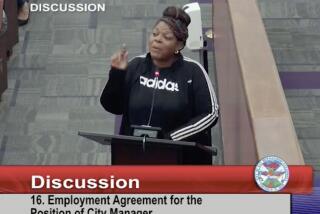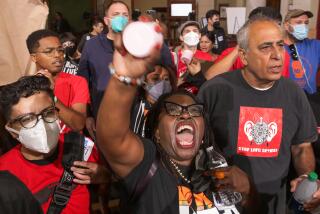Racial Epithet Still Echoing at an Elks Club
- Share via
BURBANK — Kelly Kendrick joined the Elks seeking friends and a good game of billiards. But after the “Exalted Ruler” of Lodge No. 1497 in Burbank allegedly used racial slurs in conversations with him, Kendrick began seeking justice.
Kendrick, one of the few African American members of the lodge, says Tom Brookman, a 53-year-old architect, used an offensive epithet referring to blacks twice in conversations with him.
Brookman, who said he was only joking, was found not guilty of “conduct unbecoming an Elk” by a closed Elks court last week.
Kendrick, who was sworn in as an Elk in June, said he has been bolstered by an outpouring of indignation from Elks who have rallied to his side, and plans to appeal.
“I could walk away,” said Kendrick, 48, a radiology technician and Air Force veteran. “But it’s time for a change. I got to make a stand for all minorities.”
The incident has become a flash point illuminating both what some say is a lingering taint of racism among the mostly white Elks, and a growing impatience with that same “old-school”-style bigotry among members.
At issue also is the particular racial slur that sparked the controversy, one that carries “the strongest taboo of any word at this time in American English,” according to Michael Agnes, editor in chief of Webster’s New World Dictionary.
*
“The idea that in this time and day people still talk like that and can hold a position in an organization--why, I think it sucks,” said 73-year-old Elks member Carlos Copelin, a retired truck driver, who is white and speaks in a slow Southern drawl.
Kendrick said that he decided to join the Elks after his billiards buddies encouraged him to do so. Shortly after, while practicing billiards at the lodge, he introduced himself to Brookman, he said. Brookman replied: “I’m the head [epithet] in charge here,” Kendrick said.
Kendrick said he was stunned. “I felt hurt. Insulted . . . I don’t talk that way to black people. It’s degrading.” He later approached Brookman to tell him he thought the remark was inappropriate.
But a few weeks afterward, Brookman pulled him aside at the lodge again and used the same racial epithet to refer to another member’s wife, who is black, Kendrick said.
Brookman declined to comment in detail on Kendrick’s story, saying that while the matter is still under appeal in a higher Elks court, he is bound by an Elks oath not to discuss the proceedings.
But he said he bears blacks no ill will, and that Kendrick mistook his joking intent.
“It was not intentional to harm him,” Brookman said, noting that he has heard the word used on the radio, by comedians, and that it is used by blacks.
Brookman said he would not repeat his behavior.
“As multiethnic people begin to live with each other, they are going to have to learn to communicate and see where each other’s feelings are hurt,” Brookman said. “Only through situations like this can you learn this.”
Other Elks said they are concerned that racist remarks are tolerated by the Elks. One member, Ron Sudy, 51, said that shortly after Kendrick joined the lodge, a racist flier was briefly circulated.
“I hate to see this happen, especially behind the American flag,” said Sudy.
*
Mike Lombardo, an Elk of Italian descent whose African American wife was the subject of Brookman’s alleged second comment, said he once threatened a fellow Elk with a pool cue because the man made a racist remark.
“‘What I clearly don’t understand is how they can wrap themselves in the flag and the Bible and be rednecks,” he said.
William Mallozzi, 65, a former mortgage broker now writing screenplays, said some of the Elks, “lack education, not in the formal sense, but in life experience.”
Formed in 1868 by a group of English actors in New York, the Benevolent and Protective Order of Elks gained prominence during World War I as a charity for war veterans, and even built veterans hospitals, which were later donated to the government, said Frank Garland, chairman of the national advisory committee for the order.
Over the years, the Elks gained a reputation as a fraternity of the most stalwart of middle-class white citizenry. Belief in God and respect for the flag are still requirements of membership.
It wasn’t until 1973 that the Elks’ national congress approved the admission of nonwhites. And it took 20 more years for them to approve the admission of women, Garland said.
But Garland said the Elks aren’t racist, and today are successfully integrated. Of the Burbank incident, he said: “In any organization you get a bad apple.”
The racial epithet at the center of the Elks uproar has been the subject of increasing debate in recent years. Webster’s New World Dictionary’s Third College Edition calls the epithet “virtually taboo” and “a viciously hostile epithet.”
The censorious tone is no accident, said Agnes, the dictionary’s editor. “It’s one of the few words in the dictionary I actually have trouble getting out,” he said.
The word has been in use since the 18th century, according to University of California-Berkeley sociolinguist Robin Lakoff. One of its first known citations is in a poem by Robert Burns, she said.
Its emotional impact in American English comes from its ties to “a time when things that are unthinkable were perfectly permissible,” Lakoff said.
Last month, the epithet sparked a controversy involving the NAACP and the publishers of Merriam-Webster’s Collegiate Dictionary over its definition. Although the dictionary describes the word as offensive, it also defines it as “a member of any dark-skinned race.”
*
NAACP President Kweisi Mfume said the word should be defined as a racial epithet, and not a noun designating a people.
In the Burbank lodge, where people of different races rub shoulders over billiard tables and beer, the issues seem less clearly delineated.
Some Elks attribute the controversy to personality conflicts within the lodge. And several of the Elks said privately that Brookman’s actions were not so much racist as simply insensitive and poorly thought-out.
Only a few Elks who described themselves as outraged on Kendrick’s behalf spoke at length about the broader context of race relations. Most focused on the idea that their well-liked and respected billiard companion may have been treated disrespectfully.
“We are 100% behind Kelly,” said Lombardo. “A lot of the guys . . . bicker and say things. But I’m not sure how much it is that they hate anything in particular. They just hate.”
Kendrick himself said he hopes for reconciliation with Brookman. But until then, he plans to pursue his appeal to the Grand Forum--the Elks equivalent of a Supreme Court.
Brookman said he is eager to see the matter settled so that the Elks can focus on charity, such as the Christmas baskets they help compile every year.
“I hope that Kelly and I could become good friends and learn from this,” he said.
More to Read
Sign up for Essential California
The most important California stories and recommendations in your inbox every morning.
You may occasionally receive promotional content from the Los Angeles Times.













